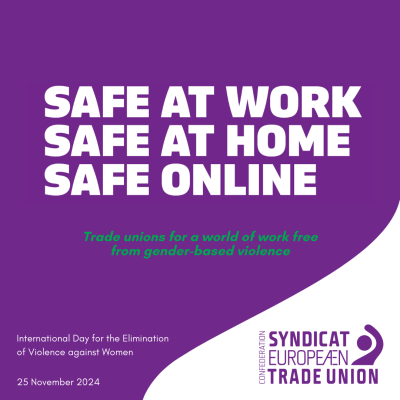Europe’s laws are not keeping up with new and rising threats against women in the workplace, a new report shows on the international day for the elimination of violence against women.
Increased digitalisation and precariousness have contributed to a rising tide of violence gender-based violence at work.
But an analysis of legal frameworks shows that the existing European and national laws on gender based violence at work are yet to be adjusted to address recent developments.
That is why the ETUC has written to European Commission President Ursula von der Leyen to call on her to bring forward a new directive on gender based violence at work, supporting unions to collectively bargain for safe workplaces.
The report for European Trade Union Confederation (ETUC), ‘Safe at Home, Safe at Work, Safe Online’, found:
- With the rise of telework and remote work, as well as economic dependency, domestic violence has become more than ever a workplace issue. “We had previously raised awareness on the negative impact of domestic violence on employment of victims. However, the issue is not currently widely regarded as a workplace concern.” - Hege Herø, YS, Norway.
- Trade unions reported an increase in violence against women workers by non-colleagues.
“We are noticing increased third-party violence directed at women in recent years, especially in front-line sectors such as the health and social care sector, retail and hospitality sector. There are not enough workers to do the job, so people are becoming abusive.” - Irena Štamfelj, ZSSS, Slovenia
- Digitalising working environments are a fertile environment for cyberviolence, including cyberharassment, violation of privacy and gender-based biases through reliance on AI. “Remote work and digitalisation are factors involved in cyberbullying. Sending sexually explicit videos and messages are the main methods used by perpetrators.” - Raquel Gómez Merayo, CCOO, Spain.
The Directive combatting violence against women and domestic violence, adopted earlier this year, overlooked violence faced by women in the world of work.
That is despite the fact that 16% of women in EU said the most serious violence by a non-partner took place at work, according to the EU Agency for Fundamental Rights.
A survey by the ETUC also found 72% of trade unions in 15 member states also say their country’s laws to tackle violence and harassment in the world of work are not strong enough.
ETUC Deputy General Secretary Isabelle Schömann said:
“Recent changes in the world of work mean women are increasingly facing physical violence or online harassment. Work from home has increased domestic violence, women are facing more abuse on the front line of underfunded public services and digitalisation has led to growing cyberharrassment.
“Unfortunately politicians have failed to ensure our laws have kept up with the new threats faced by women at work.
“The recent EU directive on combatting violence against women unfortunately failed to deliver concrete measures to make workplaces safer for women workers.
“That is why, on the international day for the elimination of violence against women, I am calling on President von der Leyen to bring forward a new directive dedicated to combatting violence against women at work.
“We will hear strong words today from politicians from all parties. But we will judge them on their deeds not words.”
Notes
Report: Safe at work, safe at home, safe online: Tackling gender-based violence and harassment in a changing world of work

